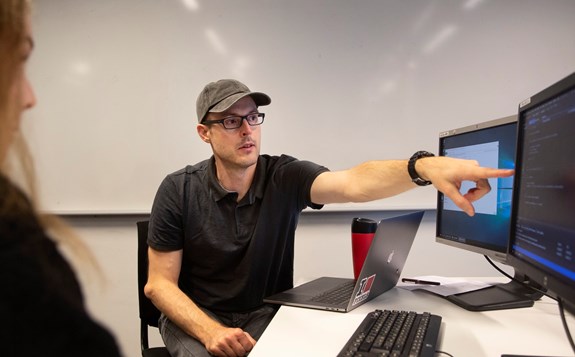We use cookies on this website. Cookies help us deliver the best experience on our website. Read about cookies.
-
- Education
- Education
- Programmes and courses
- Applications and admissions
- Tuition fees
- Scholarships
- Exchange studies at Malmö University
- Study Guidance
-
- After admission
- After admission
- Moving to Malmö
- Pre-orientation
- Arrival guide
-
- About studies at Malmö University
- About studies at Malmö University
- Why choose Malmö University
- Understanding university studies
- Connect with our students
On the page -
- Research
- Research
-
- Doctoral studies
- Doctoral studies
- Doctoral courses
-
- Doctoral schools
- Doctoral schools
- Doctoral school: Education, Learning and Globalisation
- Doctoral school: The National Research School for Professionals in Social Services
- Doctoral school: Learning in Multicultural Societal Contexts
- Doctoral school: ComBine
- Doctoral school: Swedish National Graduate School in Science and Technology Education Research
- Doctoral school: Relevancing Mathematics and Science Education (RelMaS)
- Doctoral school: Sustainable Movement Education
- Doctoral school: Finding ways in a time of great future challenges (FinnFram)
- Doctoral school: Pedagogy and Vocational Skills
- Doctoral school: Culturally Empowering Education through Language and Literature
- Research subjects
-
- Research centres
- Research centres
- Biofilms Research Centre for Biointerfaces
- Citizen Health
- Imagining and Co-Creating Futures
- Institute for Urban Research
- Malmö Institute for Migration Studies
- Literacy and Inclusive Teaching
- Centre for Work Life Studies
- Sustainable Digitalisation Research Centre
- Centre for Sexology and Sexuality Studies
-
- Research publications
- Research publications
- Search publications
- Malmö University Press
- Research events
- Participate in a research study
- Coffee Break Quiz
On the page -
- Collaboration and Innovation
- Collaboration and Innovation
- Innovation
- Collaboration with students
-
- Collaborate with researchers
- Collaborate with researchers
- Labs and facilities
- Culture collaboration
- Support Malmö University
- Alumni & Friends
On the page -
- About us
- About us
-
- Faculties and departments
- Faculties and departments
-
- Faculty of Culture and Society
- Faculty of Culture and Society
- Department of Urban Studies
- Department of Global Political Studies
- School of Arts and Communication
-
- Faculty of Education and Society
- Faculty of Education and Society
- Department of Childhood, Education and Society
- Department of Sports Sciences
- Department of Natural Science, Mathematics and Society
- Department of School Development and Leadership
- Department of Culture, Languages and Media
- Department of Society, Culture and Identity
-
- Faculty of Technology and Society
- Faculty of Technology and Society
- Department of Computer Science and Media Technology
- Department of Materials Science and Applied Mathematics
-
- Faculty of Odontology
- Faculty of Odontology
- Master's programmes in Dental Science
- University Dental Clinic
- Management and decision-making paths
-
- Vision, objectives and strategy 2025
- Vision, objectives and strategy 2025
- Global engagement
- Sustainability
- Widened recruitment and participation
- Quality assurance work at the University
-
- Malmö Academic Choir and Orchestra
- Malmö Academic Choir and Orchestra
- Student work – video pieces
-
- Annual Academic Celebration
- Annual Academic Celebration
- Academic traditions
- Meet our new professors
- The University in a troubled world
On the page
The Centre for Teaching and Learning (CAKL)
Teaching and Learning
The Centre for Teaching and Learning (CAKL) is a university-wide centre that offers education and carries out research within teaching and learning in higher education, widening recruitment and widening participation and more. We support teachers in conducting their teaching and students in developing their learning.
About The Centre for Teaching and Learning (CAKL)
CAKL's overall mission is to support Malmö University's aspirations to ensure high quality education. CAKL offer courses for both students and staff.
Education for students aims to support academic introduction and language proficiency. CAKL also develops university pedagogic activities and is responsible for professional development in teaching and learning in higher education. CAKL will forefront the establishment of a university-wide, pedagogical research environment to help promote courses and programmes that are scientifically based on pedagogy.
JOTL
Journal of Teaching and Learning in Higher Education

Journal of Teaching and Learning in Higher Education
The purpose of the Journal of Teaching and Learning in Higher Education (JoTL) is to spread and support the growth and development of knowledge about learning and teaching in higher education at Malmö University. The journal is an e-journal that is reviewed editorially and is available according to the open access principle.
-

Eva Davidsson - Associate Professor
eva.davidsson@mau.se
-

Fredrik Portin - Associate Professor/Lecturer
fredrik.portin@mau.se
-

Henriikka Wilinger - Associate senior lecturer
henriikka.wilinger@mau.se
-
KD
Katherine Doerr - Associate senior lecturer
katherine.doerr@mau.se
-
ML
Marie Leijon - Associate Professor/Senior lecturer
marie.leijon@mau.se
-

Nathalie Auer - Senior lecturer
natalia.auer@mau.se
-

Stefan Larsson - Lecturer
stefan.larsson@mau.se
-

Adam Gray - Lecturer
adam.gray@mau.se
-

Anna Helg Granbom - Lecturer
anna.helg.granbom@mau.se
-
AS
Anna Sibinovic - Lecturer
anna.sibinovic@mau.se
-

Bo Norlund - Lecturer
bo.norlund@mau.se
-

Lasse Lindhagen - Lecturer
lasse.lindhagen@mau.se
-

Lydia Habbe - Lecturer
lydia.habbe@mau.se
-

Staffan Eriksson - Lecturer
staffan.eriksson@mau.se
-

Teresa Tomasevic - Lecturer
teresa.tomasevic@mau.se








